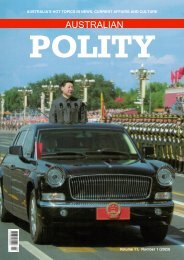EUROPELITHUANIA CALLSOUT CHINA/ KEVIN ANDREWS12 Australian Polity
Lithuanians are no strangers to foreignoppressors and totalitarians. After finally winningindependence at the end of the Great War, theyhad barely two decades of self-rule before being invadedby the Soviets in 1939. The Nazis then overran thenation in 1941, murdering more than 100,000 Jewsduring their occupation, before the Soviets reclaimedthe country. For the next five decades, Lithuania wasunder the thumb of the Soviet communists, but thespirit of the people was never quelled. In 1991, the Balticstate, the home of just 2.7 million people, proclaimed itsindependence, the first Soviet satellite to do so, earningthe wrath – and an economic blockage – from Moscow.Shortly after, the Soviet Union collapsed.Today, Lithuania is facing new threats from oppressors.Last year, the government of Prime Minister IngridaŠimonytė withdrew from the ‘17+1’ block of central andeastern European countries following Parliamentaryapproval. Formed with China in 2012, the group fosteredcooperation with Beijing, including Belt and RoadInitiative projects. The Lithuanian Foreign Minister saidthe arrangements had brought ‘almost no benefits’ tothe Baltic state after a decade. Not only did Lithuaniawithdraw from the block, it upgraded relations withTaiwan and allowed the Republic of China to establishan office in Vilnius, attracting the ire of the PRC whichwithdrew its ambassador and implemented a de factotrade embargo. Even a shipment of Lithuanian rum wasblocked, prompting Taiwan to purchase it instead! Taiwanhas also floated $200 million fund to invest in the Balticstate. The European nation would be consigned to the‘garbage bin of history’ threatened China.There are only three strategies in the Beijing playbook:bully and intimidate; accuse adversaries of doing whatChina itself does; and engage in tantrum diplomacy.All three were on display with Lithuania. Not only didthe PRC block imports from Lithuania, it halted goodsfrom Europe containing parts made in the Baltic State,leading to warnings from the EU Trade Commissionerthat Europe would take China to the WTO if the issuewas unresolved. Not that China fears the WTO; it hasflouted the Organisation’s rules ever since its entryto the body two decades ago and its de facto ban onLithuania is outside the normal jurisdiction. But thewarning impressed on China what it fears the most:concerted action by other nations in defence of aninternational rules-based order.German companies were a specific target of Beijingbullying. The car parts manufacturer, Continental, was‘instructed’ to stop using components made in Lithuania.Europe hit back at China, imposing tariffs on aluminiumexports to the continent. In turn, Taiwan is exploring themanufacture of semiconductors in Lithuania. Whether thelong-standing accommodation of China by the Merkelgovernment changes under her successor as Chancellor,Olaf Scholz, remains to be seen. German reliance onChinese trade is significant. In his first phone call withPresident Xi, Scholtz spoke about trade and failed tomention human rights at all. However, the nation’s newforeign minister, Annalena Baerbock, a China-hawk, hascalled out the PRC for its human rights record and recentlysent a naval vessel to exercise with the Vietnamese. EUparliamentarians have criticised China’s human rightsrecord and an increasing number are supportive ofTaiwan. At the heart of the EU is a commitment to theunity of the union and internal free trade – a factor Beijingseems to have underestimated. Senior French officialssaid they would push for EU action against China. Theannual EU-China summit was postponed. The Lithuanianvice- Foreign Minister stated, ‘what we decide to do, bycalling Taiwan, is up to Lithuania, not Beijing.’.Canadian Prime Minister Justin Trudeau reinforced theneed for international unity against Xi’s war on the world.Better known as the ‘warrior of woke’, Trudeau nonethelessspelt out a truism of the new geopolitical realm: “We’vebeen competing, and China has been from time to timevery cleverly playing us off each other in an open-market,competitive way. We need to do a better job of workingtogether and standing strong so that China can’t playthe angles and divide us one against the other.” Trudeaubacked up his sentiments by sending a Canadian navalvessel to the China Sea.Regrettably, the strategic reality is still falling on deafears in much of the financial and business communitywhich cling to an outdated notion that China is someversion of a free, capitalist market in which investmentswill remain safe and secure under the benign guidanceof the CCP. Exhibit number one is the head of the world’slargest hedge fund, Ray Dalio. Asked a question aboutAustralian Polity 13





